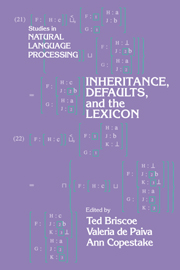Book contents
- Frontmatter
- Contents
- Contributors
- 1 Introduction
- 2 Skeptical and Credulous Default Unification with Applications to Templates and Inheritance
- 3 Prioritised Multiple Inheritance in DATR
- 4 Some Reflections on the Conversion of the TIC Lexicon into DATR
- 5 Norms or Inference Tickets? A Frontal Collision between Intuitions
- 6 Issues in the Design of a Language for Representing Linguistic Information Based on Inheritance and Feature Structures
- 7 Feature-Based Inheritance Networks for Computational Lexicons
- 8 A Practical Approach to Multiple Default Inheritance for Unification-Based Lexicons
- 9 The ACQUILEX LKB: An Introduction
- 10 Types and Constraints in the LKB
- 11 LKB Encoding of Lexical Knowledge
- 12 Defaults in Lexical Representation
- 13 Untangling Definition Structure into Knowledge Representation
- Appendix A A Bibliography of ACQUILEX Papers Connected with the LKB
- Appendix B The LKB Description Language Syntax
- Appendix C Software Availability
- References
- Author index
- Subject Index
7 - Feature-Based Inheritance Networks for Computational Lexicons
Published online by Cambridge University Press: 01 April 2010
- Frontmatter
- Contents
- Contributors
- 1 Introduction
- 2 Skeptical and Credulous Default Unification with Applications to Templates and Inheritance
- 3 Prioritised Multiple Inheritance in DATR
- 4 Some Reflections on the Conversion of the TIC Lexicon into DATR
- 5 Norms or Inference Tickets? A Frontal Collision between Intuitions
- 6 Issues in the Design of a Language for Representing Linguistic Information Based on Inheritance and Feature Structures
- 7 Feature-Based Inheritance Networks for Computational Lexicons
- 8 A Practical Approach to Multiple Default Inheritance for Unification-Based Lexicons
- 9 The ACQUILEX LKB: An Introduction
- 10 Types and Constraints in the LKB
- 11 LKB Encoding of Lexical Knowledge
- 12 Defaults in Lexical Representation
- 13 Untangling Definition Structure into Knowledge Representation
- Appendix A A Bibliography of ACQUILEX Papers Connected with the LKB
- Appendix B The LKB Description Language Syntax
- Appendix C Software Availability
- References
- Author index
- Subject Index
Summary
Abstract
The virtues of viewing the lexicon as an inheritance network are its succinctness and its tendency to highlight significant clusters of linguistic properties. From its succinctness follow two practical advantages, namely its ease of maintenance and modification. In this chapter we present a feature-based foundation for lexical inheritance. We shall argue that the feature-based foundation is both more economical and expressively more powerful than non-feature-based systems. It is more economical because it employs only mechanisms already assumed to be present elsewhere in the grammar (viz., in the feature system), and it is more expressive because feature systems are more expressive than other mechanisms used in expressing lexical inheritance (cf. DATR). The lexicon furthermore allows the use of default inheritance, based on the ideas of default unification, defined by Bouma (1990a).
These claims are buttressed in sections sketching the opportunities for lexical description in feature-based lexicons in two central lexical topics: inflection and derivation. Briefly, we argue that the central notion of paradigm may be defined directly in feature structures, and that it may be more satisfactorily (in fact, immediately) linked to the syntactic information in this fashion. Our discussion of derivation is more programmatic; but here, too, we argue that feature structures of a suitably rich sort provide a foundation for the definition of lexical rules.
We illustrate theoretical claims in application to German lexical structure.
- Type
- Chapter
- Information
- Inheritance, Defaults and the Lexicon , pp. 90 - 136Publisher: Cambridge University PressPrint publication year: 1994
- 3
- Cited by



